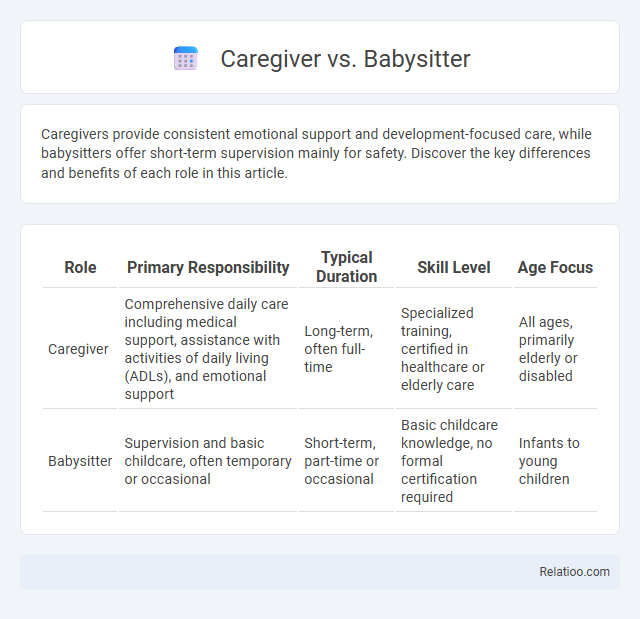Caregivers provide consistent emotional support and development-focused care, while babysitters offer short-term supervision mainly for safety. Discover the key differences and benefits of each role in this article.
Table of Comparison
| Role | Primary Responsibility | Typical Duration | Skill Level | Age Focus |
|---|---|---|---|---|
| Caregiver | Comprehensive daily care including medical support, assistance with activities of daily living (ADLs), and emotional support | Long-term, often full-time | Specialized training, certified in healthcare or elderly care | All ages, primarily elderly or disabled |
| Babysitter | Supervision and basic childcare, often temporary or occasional | Short-term, part-time or occasional | Basic childcare knowledge, no formal certification required | Infants to young children |
Understanding the Roles: Caregiver vs Babysitter
Understanding the roles of caregiver versus babysitter highlights key differences in responsibilities and qualifications. Caregivers often provide comprehensive, long-term support including medical care, assistance with daily activities, and emotional support for elderly or disabled individuals. Babysitters typically focus on short-term supervision of children, ensuring safety and basic needs without the extensive duties or specialized training required of caregivers.
Key Responsibilities: What Sets Them Apart
Caregivers primarily focus on assisting individuals with daily living activities such as bathing, medication management, and mobility support, often catering to elderly or disabled clients. Babysitters are responsible for supervising children in the absence of parents, ensuring safety, playtime, and basic childcare tasks during short-term or occasional engagements. Nannies combine childcare duties with household management, providing long-term, personalized care that includes educational support, meal preparation, and transportation for children.
Required Qualifications and Training
Caregivers require formal qualifications such as certification in CPR, first aid, and often specialized training in elder care or disability support, emphasizing long-term care skills. Babysitters typically need basic first aid knowledge and experience with child supervision, but formal training is less stringent and more flexible. Your choice depends on the level of training and credentials needed, with caregivers offering more extensive qualifications for specialized care.
Child Development Focus: Caregiver vs Babysitter
Caregivers provide ongoing emotional support and developmental guidance tailored to a child's cognitive, social, and emotional growth, ensuring consistent nurturing and skill-building activities. Babysitters typically offer short-term, supervisory care focused on safety and basic needs, with limited involvement in structured developmental activities. Choosing a caregiver over a babysitter supports long-term child development through personalized attention and continuity in learning and emotional bonding.
Typical Work Environments
Caregivers typically work in diverse settings such as private homes, assisted living facilities, or hospitals, providing personalized care for elderly or disabled individuals. Babysitters usually operate in family homes, watching over children during short-term periods, often evenings or weekends. Your choice depends on the environment you're comfortable in and the type of care you aim to provide.
Duration and Commitment Levels
Babysitters typically provide short-term, occasional care for your child, often during evenings or weekends, with minimal long-term commitment. Caregivers usually offer more consistent, part-time or full-time support, focusing on daily assistance with your child's routine and developmental needs. Nannies combine duration and commitment by often living in or working full-time, offering personalized, ongoing care designed to support your family's long-term lifestyle.
Costs and Hiring Considerations
Caregivers typically cost more than babysitters due to their specialized training in medical and personal care, making them ideal for elderly or disabled family members. Babysitters are more affordable, focused on short-term child supervision, and generally require less formal experience, which suits occasional childcare needs. When hiring, consider your specific needs: caregivers require background checks and certifications, while babysitters may only need basic screening, ensuring your family's safety and budget align with the care provided.
Emotional Bonds and Child Relationships
Caregivers build strong emotional bonds with children by providing consistent support and nurturing, which fosters trust and long-term attachment crucial for child development. Babysitters typically offer short-term supervision with less opportunity to form deep emotional connections, focusing primarily on safety and basic care during their limited time. Caregivers often engage in daily routines and personalized interactions that enhance children's emotional security and promote healthy relational growth.
Family Needs: Choosing the Right Option
Selecting the right childcare provider depends on specific family needs, such as the level of care and frequency required. Caregivers typically offer personalized, consistent support for daily routines and special needs, while babysitters are suited for occasional, short-term supervision. Evaluating factors like the child's age, family schedule, and desired interaction helps determine whether a caregiver, babysitter, or nanny best matches the household's care demands.
Making the Best Choice: Factors to Consider
Choosing between a caregiver and babysitter depends on your child's age, needs, and the level of care required. Caregivers typically offer specialized assistance, including medical support and developmental activities, while babysitters provide temporary supervision during shorter periods. Evaluating your family's specific requirements ensures you select the best fit for your child's safety and well-being.

Infographic: Caregiver vs Babysitter
 relatioo.com
relatioo.com